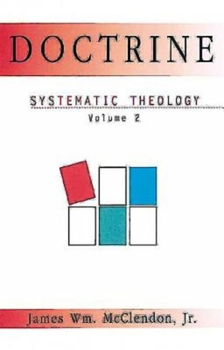Doctrine: Systematic Theology Volume 2
Select Format
Select Condition 
Book Overview
The radical effects of the 16th century Reformation have been felt through generations and have profoundly shaped theology. James William McClendon explores the impact of these effects for the heirs... This description may be from another edition of this product.
Format:Paperback
Language:English
ISBN:0687110211
ISBN13:9780687110216
Release Date:August 1994
Publisher:Abingdon Press
Length:540 Pages
Weight:1.85 lbs.
Dimensions:1.3" x 6.0" x 9.0"
Customer Reviews
2 ratings
Brilliant--when you can figure it out
Published by Thriftbooks.com User , 23 years ago
I must disagree with my friend and classmate Rob Stovall in his review above. When I was forced to slog through this volume for Theology I and II at the Baptist Seminary in Richmond I with many others hated it--the style and presentation are indeed dense and difficult. But with time I have seen some of the originality and brilliance lurking here--insofar as a reader can figure out what McClendon is saying! His emphasis on the picture language of Scripture is an invaluable alternative to "fundamentalist" attempts to distill the Bible into discrete and entirely consistent propositions. It is this effort to stick to the real "plain sense" of Scripture, rather than parrot traditionalist (non-)readings thereof, which one appreciates most, even if McClendon does not adequately explain what may be some of his most brilliant and original contributions regarding doctrine as practice, eschatology and the beginning of our understanding of creation, and "ordinances" as "effective practices"--quasi-sacremental(?) understandings of baptism, communion, and preaching.
Potentially life-changing theology
Published by Thriftbooks.com User , 24 years ago
The appearance of (yet) another systematic theology would not generally be the occasion of great excitement. The mature thought of someone of the stature of, say, a Pannenberg may well draw large attention but a pattern fairly typical of systematic theologies is likely to be followed and while there will undoubtedly be abundant insights into specific issues, there is unlikely to be the kind of large scale revisioning of systematic theology that one finds in the work of James McClendon. McClendon's projected three-volume systematic theology is now two-thirds complete with Ethics appearing in 1986, Doctrine in 1994 and Witness forthcoming but expected shortly. McClendon's systematic theology is important for a variety of reasons. Notably, it represents, aside from Robert Jenson's new Systematic Theology , the only major and substantial, truly theological project (rather than methodological or epistemological) underway among those theologians loosely associated with the label `postliberal'. More importantly, it exemplifies an approach to theology that gives priority to the ecclesial community rather than the academy: this does not mean theology `made popular' but rather theology self-consciously rooted in the practices of the Christian community. The most conspicuous evidence of this is the way that McClendon chose to begin his systematic theology: with ethics (Vol 1)! The usual presentation of systematic theology assumes an order presumed to be the only logical and proper way: that is beginning with `prolegomena', followed by `doctrine', then `ethics'. `Prolegomena' discusses questions of method and so forth, largely in terms of current philosophy and usually in terms of philosophical `grounding' or justification for the following theological project. Doctrine provides a systematic presentation of Christian teaching often in quasi-scientific format and categories. Ethics, however, as Ron Sider says, is "often left until last and then left out"! McClendon seeks to counter this disjunction between doctrine and ethics by exemplifying another way that shows that `doctrine' and `ethics' are two sides of the same coin. It is the modern situation that has treated them separately. McClendon does not challenge the threefold description of the theological task. He recognises that our convictions that make our "common life possible fall into three broad, overlapping categories, those that inform Christian living (moral convictions), those that display the substance of Christian faith (doctrinal convictions), and those that open out into a Christian vision or worldview (philosophical convictions)." (21)It is only with the foundationalist treatment of logical priority that he is concerned. According to McClendon, one can begin with any of the three but must recognise that each one presupposes to some degree the rest. The terms represent three levels of entry into theology, three kinds of "probing". Thus it is inacc






